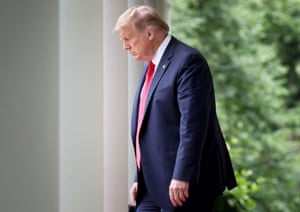‘It could have a chilling effect’: why Trump is ramping up attacks on mail-in voting
Trump is sowing doubt about mail-in voting at a time when it may be the safest way for people to cast their ballots

Photograph: Win McNamee/Getty Images
Donald Trump is escalating baseless attacks on mail-in voting in what appears to be an obvious effort to sow doubt about the fairness of the 2020 election.
The president has long made false accusations about voter fraud, claiming without evidence that 3-5 million Americans voted illegally in the 2016 election. But his barrage against mail-in voting is particularly alarming ahead of an election during the Covid-19 pandemic, where there is likely to be severely limited in-person voting and many Americans will probably vote by mail for the first time. Advocates worry voters who don’t want to risk their health and vote in person could also be swayed by Trump’s rhetoric, not feel comfortable voting by mail, and simply choose not to vote at all.
Trump’s menacing rhetoric could discourage some people, particularly minority groups, from casting mail-in votes, said Domingo Garcia, president of the League of United Latin American Citizens, which advocates on behalf of Hispanic Americans.
“It could have a chilling effect and I think that’s the intent,” he said. “President Trump is using his bully platform to try to discourage people from voting and to try to stop people from voting by mail.”
Trump’s tweets on mail-in voting in recent weeks have been a mix of unsubstantiated claims and outright falsehoods. Trump absurdly suggested on Thursday that children could steal ballots out of people’s mailboxes and distribute them to voters. Attacking a plan to mail-ballots to registered voters in California earlier this week, he also lied, saying the state was sending ballots to “anyone living in the state, no matter who they are or how they got there”. He also said mailboxes would be robbed and that voting by mail would lead to fraudulently printed and signed ballots (California allows voters to track their ballot and verifies the voter’s identity using their signature).
Donald J. Trump
(@realDonaldTrump)MAIL-IN VOTING WILL LEAD TO MASSIVE FRAUD AND ABUSE. IT WILL ALSO LEAD TO THE END OF OUR GREAT REPUBLICAN PARTY. WE CAN NEVER LET THIS TRAGEDY BEFALL OUR NATION. BIG MAIL-IN VICTORY IN TEXAS COURT TODAY. CONGRATS!!!
May 29, 2020
Last week, Trump falsely accused Michigan of planning to send absentee ballots to registered voters; the state is actually sending mail-in ballot applications to voters, a measure Republicans elsewhere have endorsed. Meanwhile, voter fraud, including fraud in mail-in voting, remains extremely rare.
Trump has openly talked about the political upside of having fewer people vote. In a March interview, he dismissed Democratic efforts in Congress to make it easier to vote by mail during the Covid-19 pandemic, saying: “If you’d ever agreed to it, you’d never have a Republican elected in this country again.”
Many people are used to brushing off Trump’s rhetoric about voter fraud, said Cliff Albright, a co-founder of the Black Voters Matter. But Albright said Trump’s comments were worrisome in a larger context of aggressive Republican efforts to police voting.
In Georgia, Albright noted, Brad Raffensperger, the secretary of state, has encouraged absentee voting but also created an “absentee ballot fraud taskforce” stacked with prosecutors to monitor mail-in voting. In Texas, which severely restricts absentee voting, Ken Paxton, the attorney general, warned of possible “criminal sanctions” for anyone who advised a voter they could use Covid-19 as the basis for requesting a mail-in ballot.
“That one-two punch is what makes it very intimidating,” Albright said. “It does influence people and does intimidate people and makes some folks feel like this is not something they want to engage in.”
The Republican National Committee is also seeking to recruit up to 50,000 volunteers to monitor voting this fall, the first time in nearly three decades when they won’t be under a federal court order barring them from engaging in poll-watching activity.
There is growing alarm that Trump’s rhetoric will lay the groundwork to contest the results of the presidential election once the ballots are counted. Unlike past elections, America is unlikely to know the winner of the presidential race on election night as officials count ballots coming in (some states allow ballots to be counted as long as they are postmarked by election day).
The candidate who appears to be ahead on election day may ultimately end up losing as more ballots are counted. And a candidate could use the gap in getting official results to claim widespread fraud, said Nathaniel Persily, a law professor at Stanford University who closely studies elections.
“That’s where the disinformation and the polarizing rhetoric and questioning of the legitimacy of elections could come in. You say there’s something fishy with the mail ballots if they are not reflective of the percentage that has not been revealed up to that point.”
Republicans offered a preview of this in 2018, when they suggested there was something amiss as Democrats in California congressional races picked up votes as the state continued to count mail-in ballots after election day. In Florida, Trump and Rick Scott, then the state’s governor, baselessly accused election officials of fraud as they counted ballots in a US Senate race Scott was running in.
To shore up confidence in the results of the election, a consortium of experts recommended last month that states and media organizations make it clear they expect a delay in reporting official results well ahead of election night.
Accepting the legitimate transfer of power is crucial to the foundation of American democracy. If there isn’t a belief the election is fair, that pillar is gone, Garcia said.
“I’m concerned that we could have a constitutional crisis if we have the same president saying that the election was somehow tainted because people voted by mail,” Garcia said. “That could lead to a possible huge crisis in America’s democracy.”




